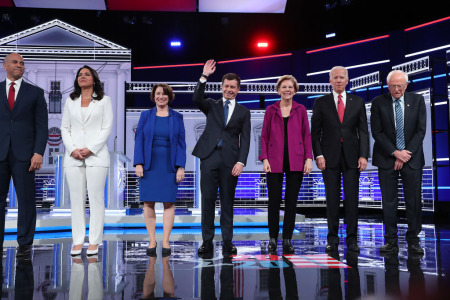New Hampshire Democratic Primary: Who did religious voters support?

The backing of voters who never attend religious services helped propel Vermont Sen. Bernie Sanders to victory in the New Hampshire Democratic primary election Tuesday while Minnesota Sen. Amy Klobuchar surprised many with a third-place showing aided by religious voters.
Nearly 3,000 Democrat voters in New Hampshire took part in exit polls after they cast their ballots. They were asked several questions about who they voted for, their identity, age, job, race, education level and even how often they attend religious services.
Among 11 percent of voters who say they attend religious services weekly, Klobuchar was the favorite even though she sits in sixth place in the Real Clear Politics average of national primary polling with just 4.6 percent support.
Klobuchar, a 59-year-old attorney, received just under 20 percent of the vote in New Hampshire, as of Wednesday afternoon. She was backed by 28 percent of voters who attend religious services each week.
Pete Buttigieg, a gay Christian and former mayor of South Bend, Indiana, who finished second in New Hampshire and won the Iowa Caucus, received 16 percent of voters who said they attend religious services weekly.
Meanwhile, 15 percent of weekly service goers backed Sanders and 14 percent said they voted for former Vice President Joe Biden, who finished fifth in New Hampshire. Just 8 percent of weekly service goers said they voted for Massachusetts Sen. Elizabeth Warren. Warren finished fourth in the New Hampshire primary.
But among the 37 percent of respondents who said they attend religious services “occasionally,” Buttigieg (26 percent) was the favorite.
Twenty-three percent of “occasional” religious attendees said they voted for Klobuchar, 20 percent said they voted for Sanders and 14 percent said they voted for Biden.
Warren again struggled with this demographic as she picked up just 7 percent of support among occasional service goers.
Among the 51 percent of voters who said they “never” attend religious services, Sanders was the clear favorite as he won 34 percent of the demographic. Biden was least favored among those who never attend religious services with only 4 percent.
Twenty-two percent of those who said they never attend religious services backed Buttigieg, 19 percent said they backed Klobuchar, and 11 percent said they backed Warren.
While Sanders’ narrow victory in New Hampshire propels him to frontrunner status, Klobuchar’s third-place finish in New Hampshire brings new-found momentum for her campaign while the campaigns of Biden and Warren suffered setbacks in Iowa and New Hampshire.
Exit polls from New Hampshire also show that about half of voters decided on which candidate they were going to vote for within the last few days. Among those voters, Buttigieg (29 percent) and Klobuchar (24 percent) were the favorites.
But for those who decided who they would vote for “before the last few days,” Sanders was the favorite with 37 percent of the vote.
Exit polls also show that the majority of Democrat voters in New Hampshire (63 percent) would rather nominate candidates they believe have a better chance at beating President Donald Trump in the general election in November. Meanwhile, 34 percent said they would prefer to nominate a candidate with whom they most agree on the issues.
Among those who said they would like to see the party nominate someone who can beat Trump, 28 percent voted for Buttigieg, 21 percent for Sanders, 20 percent for Klobuchar, 13 percent for Warren, and 10 percent for Biden.
Among those who prefer a candidate that most agrees with them on the issues, 39 percent said they voted for Sanders, 21 percent for Buttigieg, 12 percent for Klobuchar, 6 percent for Warren, and 4 percent for Biden.
When broken down by ideology, about half of Democrats who said they are “very liberal” said they voted for Sanders (48 percent). Nineteen percent of “very liberal” voters said they backed Warren, and 15 percent backed Buttigieg.
Among the 36 percent of respondents who said they are “moderate,” Buttigieg led with 28 percent of the vote, while Klobuchar was second with 26 percent.
When broken down by age, Sanders received 51 percent of voters aged 18 to 29 and 36 percent of voters ages 30 to 44. Buttigieg (27 percent) and Klobuchar (24 percent) were most favored for those ages 45-64.
Klobuchar (32 percent) was the clear favorite among the 25 percent of voters ages 65 and over.
After polls closed Tuesday, Sanders declared that his New Hampshire victory was the “beginning of the end” for the Trump presidency.
“What I can tell you with absolute certainty, and I know I speak for every one of the Democratic candidates, is that no matter who wins, and we certainly hope it is going to be us, we’re going to unite together and defeat the most dangerous president in the modern history of this country,” Sanders said.
After winning Iowa and finishing second in New Hampshire, Buttigieg declared that his campaign is “here to stay.”
Since her third-place finish in New Hampshire, Klobuchar’s campaign has raised $2.5 million in less than a day.
“Everyone had counted us out — even a week ago," Klobuchar told supporters in New Hampshire. "I came back, and we delivered. … Because of you, we are taking this campaign to Nevada.”
The Nevada caucus will be held on Feb. 22.
Follow Samuel Smith on Twitter: @IamSamSmith
or Facebook: SamuelSmithCP





















